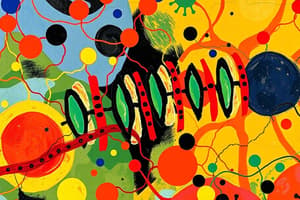Podcast
Questions and Answers
Flashcards are hidden until you start studying
Study Notes
Biological Aging
Biological aging refers to the natural process of aging at the cellular and molecular level, affecting all living organisms, including humans. It is a complex process that involves various biological, genetic, and environmental factors. Understanding biological aging is crucial for predicting and preventing age-related diseases and disabilities, as well as for developing strategies to promote healthy aging.
Telomere Shortening
Telomeres are the protective caps at the ends of chromosomes, which shorten with each cell division. As telomeres shorten, cells can no longer divide, leading to cellular aging and eventual cell death. Research has shown that telomere shortening is a major contributor to the aging process in humans.
Epigenetic Clocks
Epigenetic clocks are a set of molecular markers that can measure the age of an individual's cells. These clocks are based on the methylation of specific DNA sequences, which can predict chronological age with high accuracy. Epigenetic clocks have been developed to help researchers study the biology of aging and the effects of various interventions on aging.
Protein Homeostasis
Protein homeostasis, or proteostasis, is the balance between protein production and degradation. As we age, the efficiency of protein homeostasis decreases, leading to the accumulation of damaged proteins, which can cause cellular dysfunction and aging. Boosting proteostasis has been proposed as a potential strategy to slow down aging.
Senescence
Cellular senescence is a state of irreversible growth arrest in cells, which can occur due to various stressors, such as DNA damage. Senescent cells accumulate with age and can contribute to age-related diseases, as they secrete pro-inflammatory molecules that damage surrounding tissues. Eliminating senescent cells has been proposed as a potential anti-aging strategy.
Metabolic Changes
As we age, our metabolic processes change, leading to a decline in energy production and an increase in cellular waste. These changes can contribute to age-related diseases, such as type 2 diabetes and cardiovascular disease. Maintaining metabolic health throughout the lifespan is essential for promoting healthy aging.
Genetic Factors
Genetic factors contribute to the aging process. Certain genes are associated with longevity, while others are associated with age-related diseases. Identifying and understanding these genetic factors can help researchers develop interventions to slow down aging and prevent age-related diseases.
Environmental Factors
Environmental factors, such as diet, physical activity, and exposure to environmental toxins, can influence the aging process. Adopting healthy lifestyle choices and minimizing exposure to environmental toxins can help promote healthy aging.
In summary, biological aging is a complex process that involves various biological, genetic, and environmental factors. Understanding these factors is essential for developing strategies to prevent age-related diseases and disabilities, as well as for promoting healthy aging throughout the lifespan.
Studying That Suits You
Use AI to generate personalized quizzes and flashcards to suit your learning preferences.




